Mourners and members of the public lay flowers at the Queen’s official floral tribute area in Green Park, London on Saturday.
Elizabeth Dalziel for NPR
hide caption
toggle caption
Elizabeth Dalziel for NPR

Mourners and members of the public lay flowers at the Queen’s official floral tribute area in Green Park, London on Saturday.
Elizabeth Dalziel for NPR
It’s hard to see the grass at London’s Green Park these days, both because the grounds are piled high with flowers for Queen Elizabeth and chock full of visitors who have come by to see them.
British officials have encouraged members of the public to leave floral tributes at two dedicated royal parks, with Green Park being the primary location for laying flowers near Buckingham Palace. The park is also the final destination for tributes left elsewhere in the city, which park workers have been bringing over.
Mourners and other visitors have not disappointed. They’ve carefully deposited flower bouquets, stuffed Paddington Bears, drawings of corgis, handwritten letters, painted pebbles, flags, posters, photographs and other tokens of appreciation in rows and piles on the ground — filling the park with color and turning it into an attraction of its own. On Saturday, huge crowds surged in and out of the park, creating such a chaotic traffic jam that some people thought the area had been shut down.

Beyond the many flowers, tributes included photographs, paintings and handmade cards.
Elizabeth Dalziel for NPR
hide caption
toggle caption
Elizabeth Dalziel for NPR
Inside the tribute area, however, was a quieter scene of reflection and admiration. Many people came with multiple generations of their family to lay down flowers and take in the scene, both for its vastness and for the tiny details underfoot: thank-you cards left open, a jar of marmalade tucked underneath a stuffed bear, kids’ drawings on bright white paper against a sea of green stems.
People took photos of the scene and their loved ones posing in it, and walked through the park pointing out their favorite flowers and cards. Some have visited multiple times over the past week, while others traveled from out of town just to see the tributes, like Shaun and Tracey Dunmall, who took the train in from Kent.
“[We’re here to] see the flowers,” Tracey explained. “It’s the one thing that the people can do for her, isn’t it?”
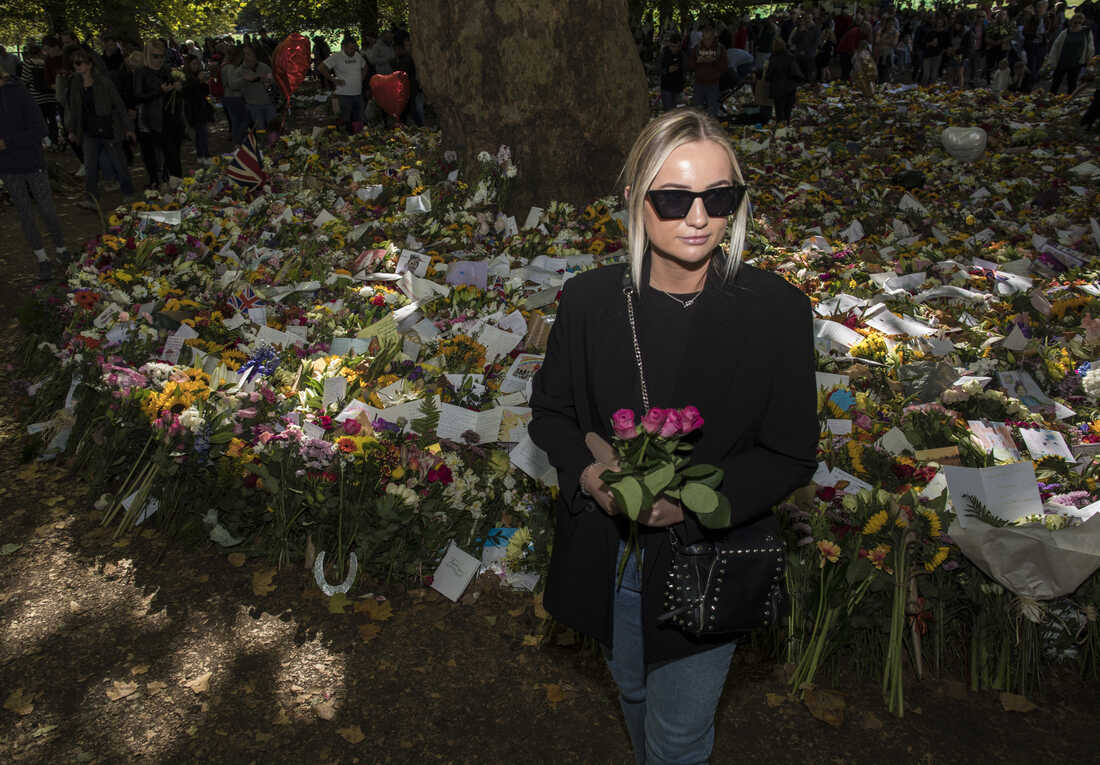
Ellie Bunn, 26, said she was looking to place her roses in a sunny spot.
Elizabeth Dalziel for NPR
hide caption
toggle caption
Elizabeth Dalziel for NPR
A woman named Fabi, visiting the park with her 21-year-old daughter, said the scene was sad on “a human level,” even for the thousands of mourners who had never met the queen.
“I suppose it reminds you of the people you have lost, and collectively it’s nice to see that people come out and pay their respects,” she said.
Many in the crowd took time searching for the perfect spot to leave their flowers.
For Ellie Bunn, 26, that meant finding an area with fresh flowers and a bit of sunlight. She was there with her mom and aunts to see the tributes for the first time — but was still thinking about her walk over, during which she saw King Charles’ motorcade driving towards Buckingham Palace. She said she was too starstruck to get her phone out in time to snap a picture.
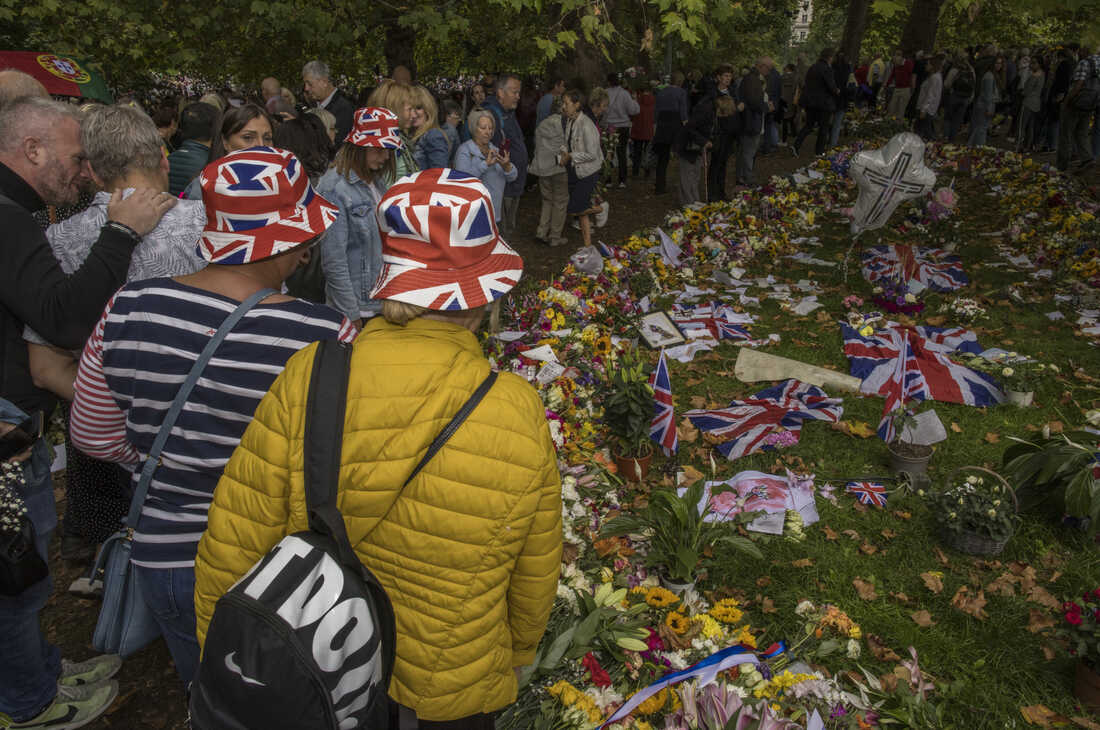
As one of just two royal parks designated for floral tributes, Green Park was bursting with patriotism.
Elizabeth Dalziel for NPR
hide caption
toggle caption
Elizabeth Dalziel for NPR
Joanna and Ben Ibbotson were happy to let their 4-year-old daughter Alice put down their flowers — she scattered them individually in various spots — and the card she’d signed herself to practice her penmanship on the train ride over.
Like everyone else NPR spoke with at the park, they said they were most moved by the handwritten tributes from young children.

Visitors took their time observing the many large rows and piles of tributes.
Elizabeth Dalziel for NPR
hide caption
toggle caption
Elizabeth Dalziel for NPR
Graham Monks, a sergeant major in the British Army, was a noticeable figure in his military fatigues and carrying a long wooden stick known as a pace stick. He’s one of thousands of soldiers in London to support the funeral proceedings, and was finally getting the chance to stop by to see the tributes on his way off of a 14-hour shift. He’d been there about five minutes and already lost track of how many people had asked him to pose with them for photos. Seeing uniformed soldiers out in public is a rare sight in Britain, he explained, as is a royal funeral.
Monks described the notes from children for the queen as particularly “gut-wrenching,” specifically mentioning a card that asked the queen to say hello to the writer’s nonnie in heaven.
“People write a lovely long essay, a long story, but actually it’s the little ones from the kids that really hit home and give you the goosebumps and the lump in your throat,” he said.

A corgi made from flowers sits in Green Park, London on Saturday.
Elizabeth Dalziel for NPR
hide caption
toggle caption
Elizabeth Dalziel for NPR
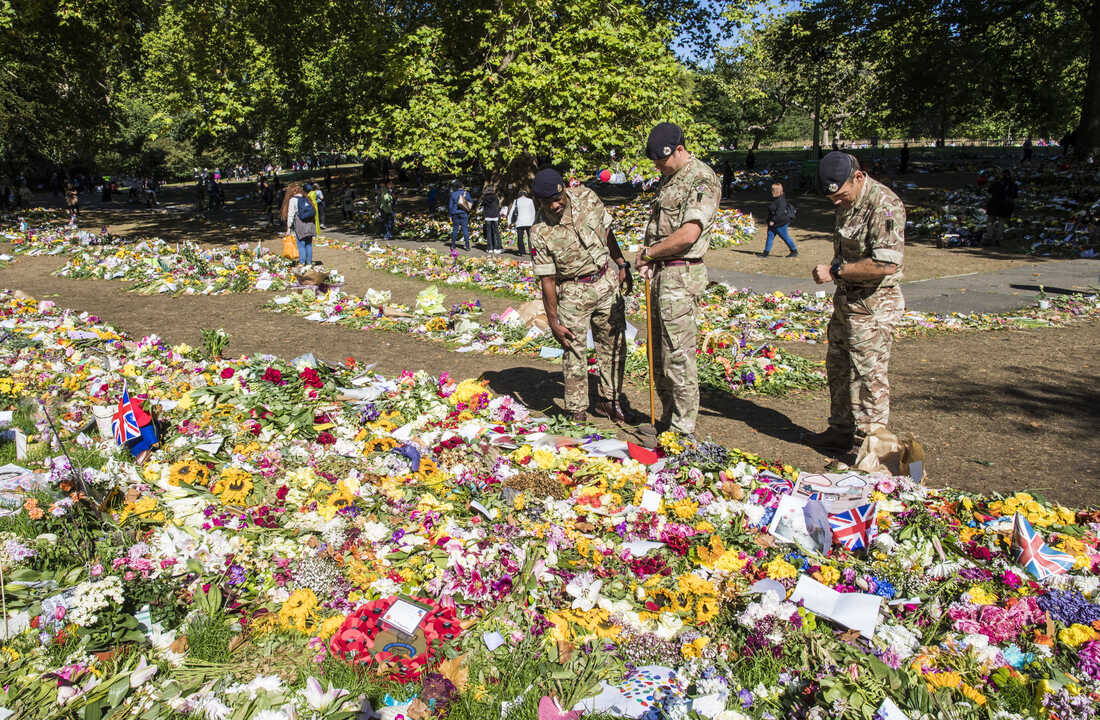
Graham Monks from the British Army looks at the Queen’s official floral tribute area, along with other members of the British Army in Green Park, London Saturday.
Elizabeth Dalziel for NPR
hide caption
toggle caption
Elizabeth Dalziel for NPR
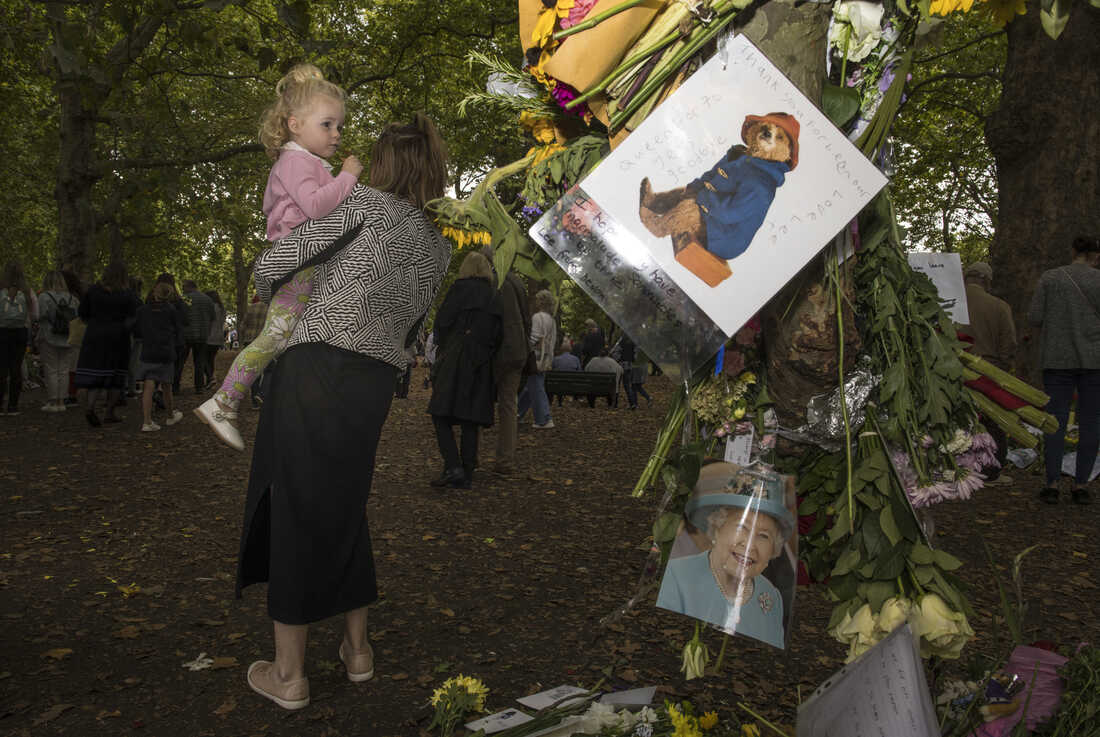
Paddington Bear made many appearances in the Green Park tribute area.
Elizabeth Dalziel for NPR
hide caption
toggle caption
Elizabeth Dalziel for NPR

Many people tried their hand at drawing the queen.
Elizabeth Dalziel for NPR
hide caption
toggle caption
Elizabeth Dalziel for NPR

Residents and visitors of all ages seemed to appreciate the colorful scene.
Elizabeth Dalziel for NPR
hide caption
toggle caption
Elizabeth Dalziel for NPR

The park’s trees became part of the tribute, as people hung balloons and flags from their branches and taped cards to their trunks.
Elizabeth Dalziel for NPR
hide caption
toggle caption
Elizabeth Dalziel for NPR
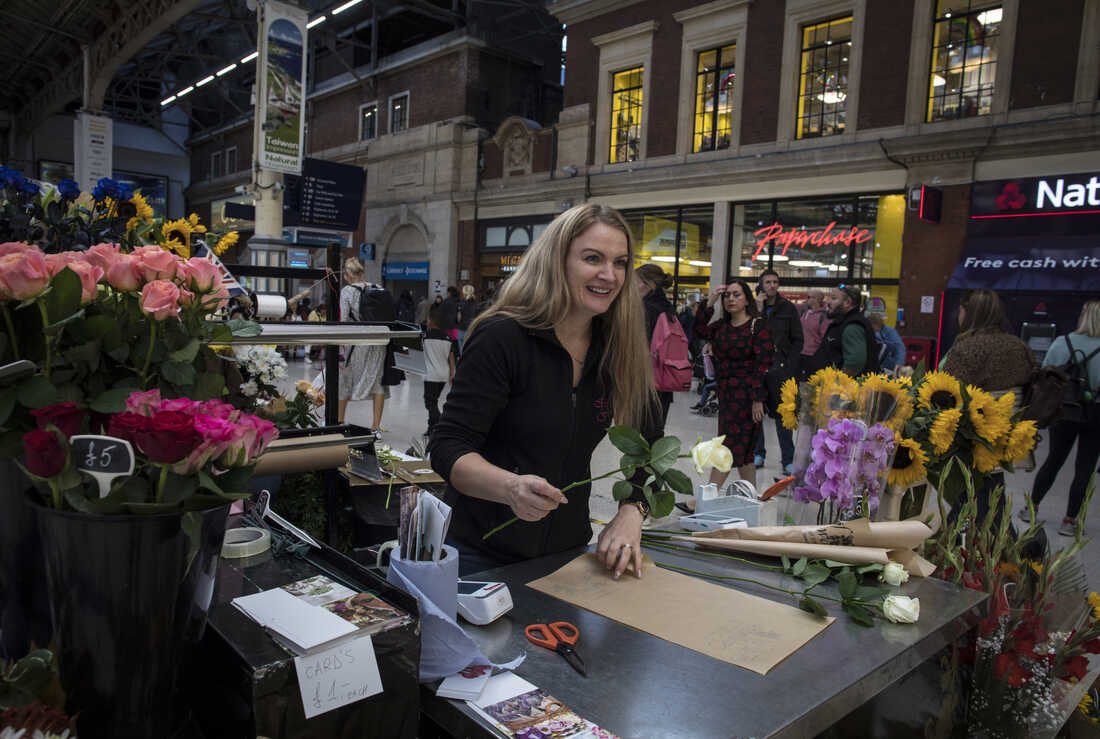
Loreta Mujaj sells flowers in Victoria station in London on Saturday.
Elizabeth Dalziel for NPR
hide caption
toggle caption
Elizabeth Dalziel for NPR
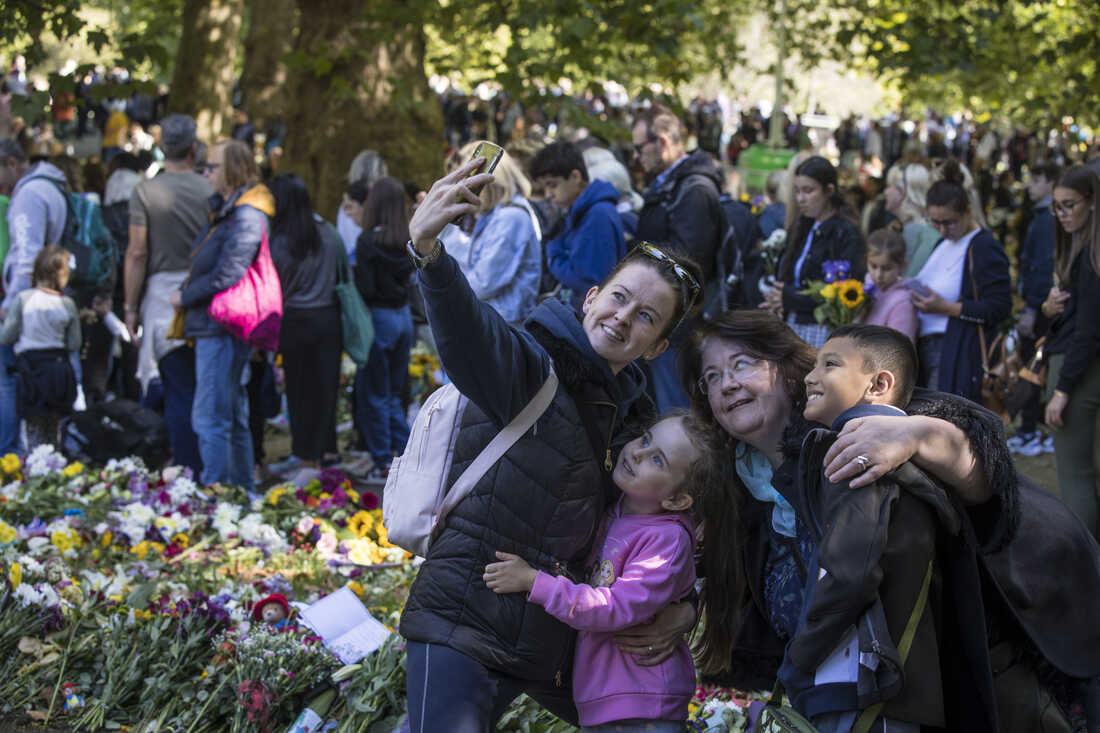
Many people were their with family members to take in the historic scene.
Elizabeth Dalziel for NPR
hide caption
toggle caption
Elizabeth Dalziel for NPR















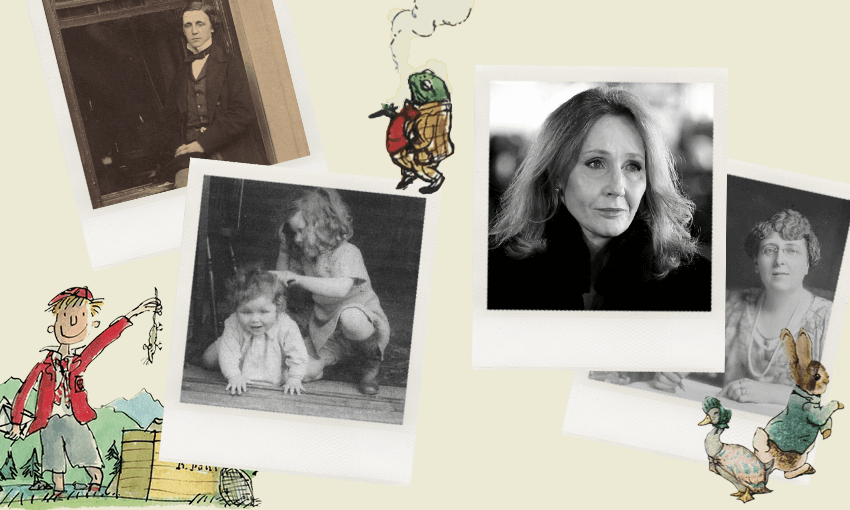

Discussion about this post